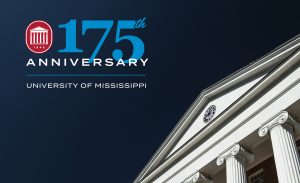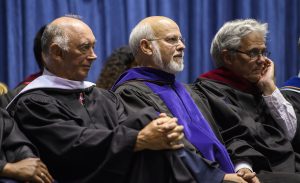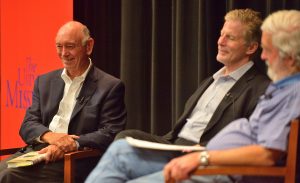
When Charles Overby came to the university in 1964, he dreamed of becoming a journalist. Nearly 60 years later, Overby is known as the man who changed the face of journalism in Mississippi and across the South. Photo by Colin Kennedy/School of Journalism and New Media
OXFORD, Miss. – Tucked away on the second floor of Farley Hall is an office that not many people know about. The building’s facade may carry his name, but the man who sits behind the desk doesn’t look for notoriety or recognition, despite the fact that his legacy changed the landscape of journalism across Mississippi.
The walls of Charles Overby’s office show a lifetime of journalism – from Pulitzer Prize-winning articles to front page issues from his days as editor-in-chief of the University of Mississippi‘s student newspaper, The Daily Mississippian.
His history with the profession, however, goes back farther than that.
 Overby’s first interaction with journalism began in the 1950s on his bicycle as he delivered newspapers in Jackson at age 11. In 10th grade, Overby had to choose an elective and, on his mother’s recommendation, decided to try out journalism, he said.
Overby’s first interaction with journalism began in the 1950s on his bicycle as he delivered newspapers in Jackson at age 11. In 10th grade, Overby had to choose an elective and, on his mother’s recommendation, decided to try out journalism, he said.
“On the second day of class, I turned to my friend in a desk next to me and I said, ‘If they pay you to do this, this is what I’m going to do the rest of my life.'”
And he did.
Student Journalist
What began as an elective grew to be a calling and a passion, said Overby, who is chairman of the Overby Center for Southern Journalism and Politics.
While working for his high school newspaper, Overby said his goal was to attend Ole Miss and serve as editor-in-chief of The Daily Mississippian, which was then an elected position. Students competed against one another for the spot, many being backed by the sororities and fraternities.
“I was not in a fraternity, but I was fortunate to have friends in the major fraternities,” Overby said. “So that really worked out well because rather than one fraternity running against another for editor, most all the major fraternities supported me.”
Overby achieved his high school dream of leading the student newspaper 1967, and framed copies of the student paper hang on the walls in his office in the Overby Center.

Charles Overby, namesake of the Overby Center for Southern Journalism and Politics, keeps photos of historic moments and news in his office on the top floor of Farley Hall. One picture frame contains copies of the university’s student newspaper, The Daily Mississippian, from the 1968, when Overby was editor-in-chief. Photo by Colin Kennedy/School of Journalism and New Media
As a student, Overby met William Rothacker Gottshall, then Associated Student Body president, and the two would become lifelong friends.
“We’d go to the old journalism building,” said Gottshall, executive director of the Lott Leadership Institute and member of the Overby Center board. “It’s no longer standing but it was an old house and there were a couple of us that would just talk politics.
“The environment was different, but it was so much fun. Our talks were invigorating and intellectually challenging. That’s where I got to know Charles firsthand.”
Though he left the university in 1968 just six credits short of a degree, Overby said the skills he learned and the friends he made in Oxford would influence the rest of his career.
After Ole Miss
After leaving the university, Overby took a job working for U.S. Sen. John Stennis in the nation’s capital, where he learned the ins and outs of D.C. politics.
Gottshall, was also in Washington working with Sen. Trent Lott and fondly remembers monthly dinners with Overby, catching up on politics and memories from Ole Miss.
“Charles opened a lot of doors for a lot of people, and he did it out of genuine caring for people,” Gottshall said. “In D.C., it’s not what you know, it’s who you know. It’s always ‘What can you do for me today?’ but Charles was so beyond that.”
Overby then took up work as the Washington correspondent for the Nashville Banner, which was later purchased by Gannett, the nation’s largest newspaper company. Overby spent the next 16 years working for Gannett as a reporter, editor and corporate executive.
In 1982, Al Neuharth, founder and owner of USA Today, appointed Overby as executive editor of The Clarion Ledger, the newspaper he had delivered on a bicycle 30 years before.
At the Ledger, Overby led the newspaper’s news and editorial coverage of the need for education reform in Mississippi. The coverage earned the newspaper a coveted Pulitzer Prize in 1983.
“It’s a funny thing,” Overby said. “We learned about it by reading it come across the Associated Press wire. It’s not like they call you in advance.

Charles Overby (left), along with Charlie Mitchell and Joe Atkins, listens to a speaker during the 2018 commencement program for the School of Journalism and New Media. Overby, who attended Ole Miss in the mid-1960s, helps young journalists chase their passions. Photo by Thomas Graning/Ole Miss Digital Imaging Services
“So whenever the story comes out, they started saying who won the Pulitzer and then we see our name, The Clarion-Ledger, come across. And we, of course, all cheered like crazy.”
More importantly, the newspaper’s effort helped spur lasting change in Mississippi, Overby said. In 1982, the Mississippi Education Reform Act passed, establishing state-funded kindergarten, requiring of school attendance, increasing teacher pay, authorizing the hiring of teaching assistants and truant officers, and introducing a statewide testing program.
A Lasting Mark on Journalism at Ole Miss
In 1989, Overby became president and chief executive officer of the Freedom Forum, which was then known as the Gannett Foundation. The Freedom Forum promotes awareness and protection of the First Amendment and funds the Newseum in Washington, D.C.
While away from Oxford, however, Overby continued to dedicate time to the School of Journalism and New Media, said Will Norton, the school’s former dean, who first met him when Overby was managing editor of the Nashville Banner.
Overby sat on the inaugural board of directors when the school was founded in 2009 and, before that, was looking at how to improve recruiting.
To help the program grow, he knew that scholarships and diversifying recruiting efforts was a top priority.
“In 1987, the Gannett Foundation gave us money,” Norton said. “We wrote the proposal and Charles worked with Al Neuharth, to get us a $100,000 scholarship for African American students.”
The scholarships that Overby envisioned helped students such as Jesse Holland, noted journalist and author, build their legacies at Ole Miss.

Charles Overby (left) speaks on a panel in the Overby Center for Southern Journalism and Politics, a UM center dedicated to promoting and protecting the First Amendment. The Overby Center invites guests from around the world to speak in the Oxford community and promotes the ideals of free speech and press. Photo by Thomas Graning/Ole Miss Digital Imaging Services
“Through the efforts of the Gannett Foundation scholarship – which I learned eventually was headed by Charles Overby – I didn’t have to wonder about whether an education at the University of Mississippi was within reach,” Holland said. “I only had to worry about living up to the standard of the great journalists who came through this program before me, like Charles Overby.”
After graduation, Holland went on to become the first full-time African American reporter at the Supreme Court.
“That’s the influence that Charles had, it wasn’t just the influence of the Education Reform Act, it was his influence of helping us get scholarship money that provided more students with more opportunities,” Norton said.
The Legacy of a Center
In the early 2000s, then-Chancellor Robert Khayat approached Neuharth about the idea for a center on campus dedicated to journalism and the First Amendment.
After three years of construction, the Overby Center for Southern Journalism and Politics opened in 2007, thanks to a $5 million grant from the Freedom Forum.
It was Overby’s influence in Mississippi politics and journalism that spurred the Freedom Forum to invest in Ole Miss, Norton said.
“One of the things I explained was that Charles had a major influence on Mississippi because William Winter had not been able to pass the Education Reform Act,” Norton said. “Charles was named the editor of The Clarion-Ledger and the Jackson Daily News.
“He came in and found a way to get that education reform passed.”
Overby retired from the Freedom Forum in 2011 and spends his time between Washington, D.C., Nashville and his office tucked away on the second floor of Farley Hall. In the years since his retirement, he has taught scores of students and continued to make an impact on the field of journalism.
When asked about Overby’s legacy, Norton kept it simple.
“If we’re going to have something on his tombstone, which would represent his legacy, it would be that he knew how to love his neighbors,” he said. “He cares about the society in which he lives, and he knew how to get things done.
“It’s not anything specific; it’s just who he is.”